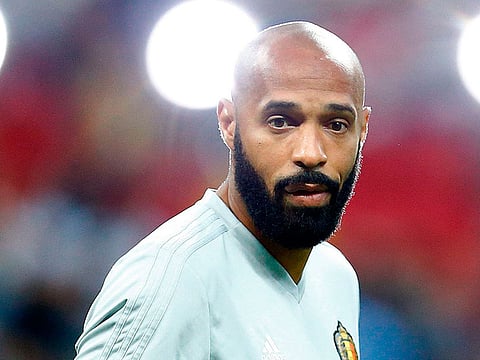Thierry Henry quits social media, calls out racist abuse and bullying: ‘It's not a safe place'
Arsenal icon is done with talking as he demands more action

Also In This Package
Thierry Henry has revealed more details about why he quit social media and what he believes online abuse can do to a person.
The Arsenal legend recently caused a frenzy after he deleted his Twitter and Instagram accounts, but not before posting a scathing statement in which he demanded better regulation of social media platforms to eradicate the “sheer volume of racism, bullying and resulting mental torture” that he described as “too toxic to ignore”.
“It’s not a safe place and it’s not a safe environment,” he told CNN Sports of his decision.
“I wanted to take a stand on saying that it is an important tool that unfortunately some people turn into a weapon because they can hide behind a fake account. I’m not saying it’s not good to have social media, I’m just trying to say that it has to be a safe place. Basically, I did what I felt, and I hope it can inspire people to do the same thing if they feel the same way,” he said.
Online racist abuse has been rampant in football and many players have spoken out against the verbal violence they are subjected to via social media, including players such as Wilfried Zaha and Marcus Rashford.
Henry is the latest player to take a stand. The former Barcelona and Arsenal striker took inspiration from other outspoken athletes, such as boxer Muhammed Ali, when he finally broke his silence.
“Muhammad Ali didn’t want to go to war, he didn’t wait to see if everyone was with him, it’s what he felt. Please understand that I’m nowhere near that calibre… but I said to myself ‘Thierry, that’s how you feel, you feel strongly about it.’ That’s what I’m going to do. To show that, obviously, I’m not happy with how things are going on social media,” he said in the CNN interview.
'That's the one that's going to hurt'
Henry, who retired in 2014, added that stadiums are slightly less hostile since the beginning of his career, but raised concerns over the ease of which people can anonymously attack others.
“Things are a tiny bit better in the stadium but now the problem has moved on social media, where people can hide. You can always say: ‘Oh, it’s difficult to trace who it is.’ You close that account; they can open another one. So, you only move the problem. That problem has been going on for a long time and this is not an attack on anyone. It’s about making the place safer,” said Henry.
“When you see a comment on social media, although you had one million that were good, you’re going to concentrate on the bad one because that’s the one that’s going to hurt. Sometimes you try to figure it out. ‘What shall I do?’ ‘Who am I?’ ‘Is what they’re saying, is it right? Is it true?’ ‘Am I like this?’ Just imagine a kid going through those questions that I can hardly sometimes deal with,” he added.
'I've had enough talking'
Though Henry may have re-started the conversation around social media abuse, he wants to see more than just conversation.
“I’ve had enough of talking, I’ve had enough of hearing, I want to see action. I want to see how we can eradicate that and how we can move on from it,” said Henry.
“Talking is obviously not working so much. There is a lot of awareness, a lot of campaigns but it’s still happening so now I want to see the people in charge, the big guns, come out and explain,” he added.
Earlier this month, Crystal Palace player Zaha became the first footballer in the English Premier League to stop taking a knee before games (a gesture introduced last year in support of Black Lives Matter).
“As a society, I feel we should be encouraging better education in schools, and social media companies should be taking stronger action against people abuse others online – not just footballers,” Zaha said at the time.
Sign up for the Daily Briefing
Get the latest news and updates straight to your inbox








